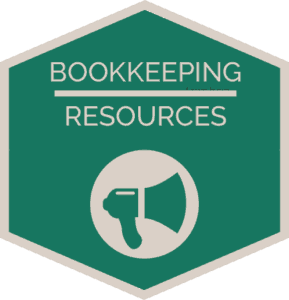
Your small business bookkeeping system is more than just debits and credits; it has multiple parts, and it’s a vital operational piece of your business.
Bookkeeping can be a d-r-e-a-d-e-d word for many entrepreneurs, but good bookkeeping will lead to a happier you. Let me explain…..
Without a good bookkeeping system, no doubt your finances are disorganized.
Financial stress is one of the highest reported stressors for people across the country.
Disorganization = more stress.
Additionally, without a solid small business bookkeeping system in place, it can lead to bad customer service experiences for YOUR clients. This can translate to lost revenue (think about it, did you ever have a company or business mess up your billing? It’s frustrating, right?); you definitely want to make sure your invoicing and billing is buttoned UP for your clients.
And I’m going to say what you already know – without a bookkeeping system you are unprepared for tax season. And if you underpay your estimated taxes or file your taxes late, the tax agencies are going to charge you fines and interest. At that rate, you might as well throw money in a trash can and LITERALLY set it on fire (this btw is a WONDERFUL image to think about when you put off your accounting).
So here are my 3 BEST tips for creating a small business bookkeeping system that works for you:
1. CHOOSE A SOFTWARE
While using Excel or Google spreadsheets to track your financials might work for a little while, eventually you’re gonna need a little more. As your business grows, the volume of your transactions will too. Your expenses will increase, you’ll have more clients and revenue to keep track of, and you may even decide to hire several employees. Imagine the drudgery of manually plugging all that stuff into a spreadsheet – oh the horror!
You need software that you can rely on that is more accurate and automated than a spreadsheet.
Don’t know where to start when it comes to accounting software? Ask the following questions:
– Do you have recurring revenue?
– Do you have to record multiple expenses? (usually that’s a yes)
– How do your clients pay you? (credit card, Venmo, direct deposit, Paypal?)
– Do you need your software to keep track of money owed to you? (not all accounting software will keep track of invoices owed)
A GOOD piece of software is going to help you with MOST of these tasks. A GREAT piece of software is going to help you with MOST or ALL of them.
In my humble opinion (cough cough and my 2+ decades of accounting experience), QuickBooks Online (QBO) provides the BEST bookkeeping system for small businesses.
QBO is a magical little tool that will help you get your financial life in tip-top shape. It does so many great things, but by far my favorite is that it “plugs into” over 4,000 different banks. This means your bank and QuickBooks Online will “talk” to each other all day long, and your transaction will be pulled into the software.
Couple this with setting up some rules so that QBO “learns” how to categorize your expenses and transactions automatically – it puts your bookkeeping on (almost) autopilot.
2. Don’t Overcomplicate it
The more complicated you make your system, the more likely you are to push bookkeeping to the back burner (remember that image of setting your money on fire??).
In other words, don’t keep track of expenses in one place (like a spreadsheet) and invoices in another (like PDF or Google docs) — and definitely don’t decide to compile the numbers you need to file your taxes at the last minute.
This is also why choosing a rockstar piece of software like QuickBooks Online can make your life easier — less stress means more time to focus on what you love about your business (which means happier clients and bigger profits!).
3. K-I-S-S
When in doubt, defer to the KISS method. Keep It Simple Stupid (yeah, I said it.)
Your small business bookkeeping system can be boiled down into four parts:
- Track your income
- Track your expenses
- Pay your taxes
- Save a little money
It’s never too early to start keeping track of your finances. At the very least, make sure you’re doing the above, and when you’re ready to level up and hire a rockstar bookkeeping team (like Good Cents!), they’ll love you so much more for having kept good track of your financial records.
P.S. This post contains affiliate links for awesome products!

